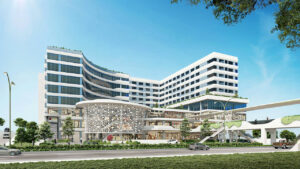PROPERTY developer AppleOne Group is working to incorporate sustainability and cultural heritage into its projects, aiming to offer personalized experiences for guests, according to a company official.
“I’m very much into sustainability, particularly the conservation of local culture. So, that’s what I really want to instill in every person in the company,” Samantha H. Manigsaca, assistant vice-president (AVP) for hospitality at AppleOne Group, said in an interview with BusinessWorld.
“I really like to go out and experience something different. For example, I love to travel and see for myself what I can bring back to the table here in Cebu.”
Ms. Manigsaca is the second-generation scion of AppleOne Group, founded in 2009 by her parents, Ray Go Manigsaca and Venus H. Manigsaca.
Prior to joining AppleOne in 2023, Ms. Manigsaca worked in different hotels like Sheraton Cebu Mactan Resort, JW Marriott Hong Kong, The Ritz-Carlton Hong Kong, The Westin Manila, and Marriott Hotel Manila.
As the AVP for hospitality, Ms. Manigsaca plays a key role in identifying locations for AppleOne Group’s property developments, banking on their accessibility to airports and major routes in Panglao and Cagayan de Oro.
“These emerging destinations, even if not traditionally preferred, are envisioned as growth hubs with AppleOne seeing the potential for their growth and beauty to be shown, offering unique opportunities for future hotel guests and residential unit owners,” according to Ms. Manigsaca.
These locations are also recognized for their untapped potential, particularly in their rich culture, heritage, and natural attractions, she added.
Under Ms. Manigsaca’s leadership, AppleOne seeks to provide more “experiential” and relaxation amenities in its hotels, citing tourist demand.
In the post-pandemic era, tourists prefer to stay within the hotel and utilize its amenities, compared to the pre-pandemic period, when they focused on visiting tourist spots.
“The difference now compared to the trends before is really more of people being into experiences, ‘experiential’ relaxation, and time with the family,” Ms. Manigsaca said.
For example, the company’s hotels feature local activities for kids like puso-making, Cebu’s famous hanging rice, while adults can enjoy physical activities like yoga and badminton.
AppleOne has been focusing on mixed-use developments to provide more options to customers, according to Ms. Manigsaca.
“We don’t usually do a standalone hotel. We always mix it with something else so that people get to enjoy this and to sustain the business of the hotel,” she said.
The developer’s upcoming Mahi Center in Mactan, Cebu, has a five-floor office building for business process outsourcing firms and features the city’s first boutique mall.
Its hotel, to be managed by the brand Fairfield by Marriott, has 196 rooms measuring around 25 square meters. Mahi Center will be launched by early 2025.
AppleOne is also bullish about the Cebu property market, particularly in Mactan, citing the increased international flights and other developments on the island.
“We see a lot of potential, especially in Mactan, because this area is right outside the airport and also nearby the [Mactan] economic zone,” she added.
Ms. Manigsaca also noted that the decline of Chinese tourists following the ban on Philippine offshore gaming operators (POGOs) presents opportunities to invite more local and other foreign tourists to Cebu.
The expected privatization of Cebu’s airports, as well as the recently approved value-added tax refund for foreigners, are also expected to drive more visitors from foreign markets.
Cebu has been an attractive destination for the Meetings, Incentives, Conferences, and Events segment, and for other tourist activities such as weddings, concerts, and marine activities like diving, Ms. Manigsaca said. — Beatriz Marie D. Cruz

